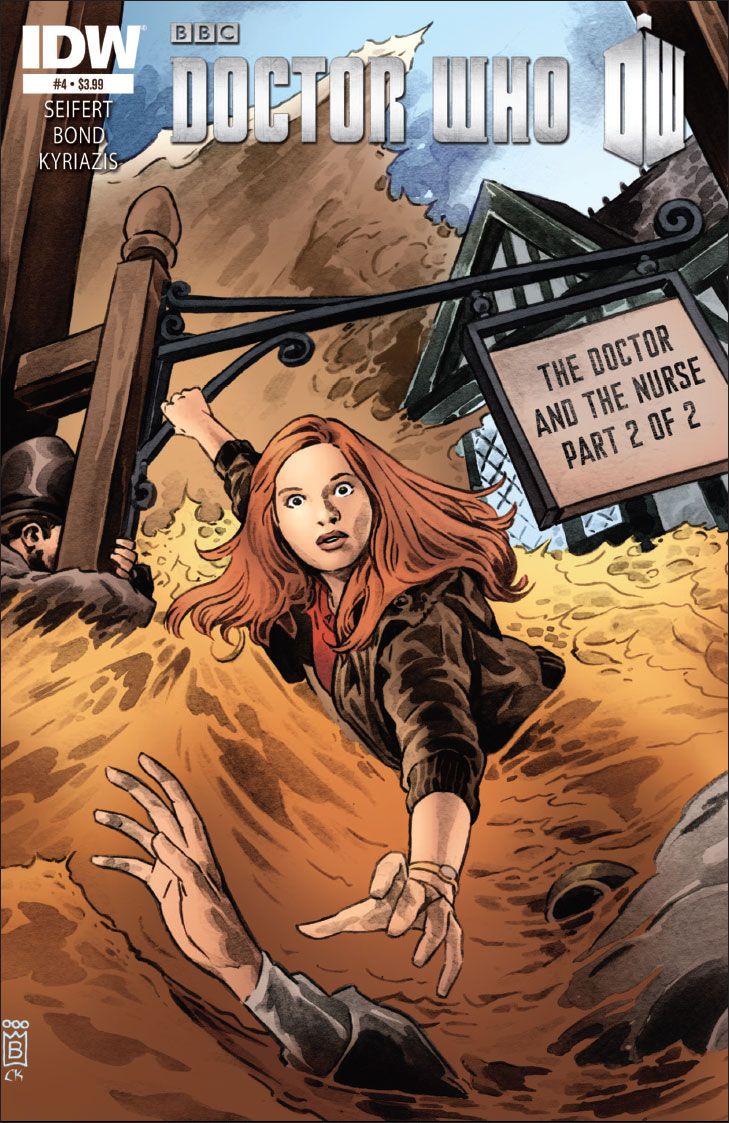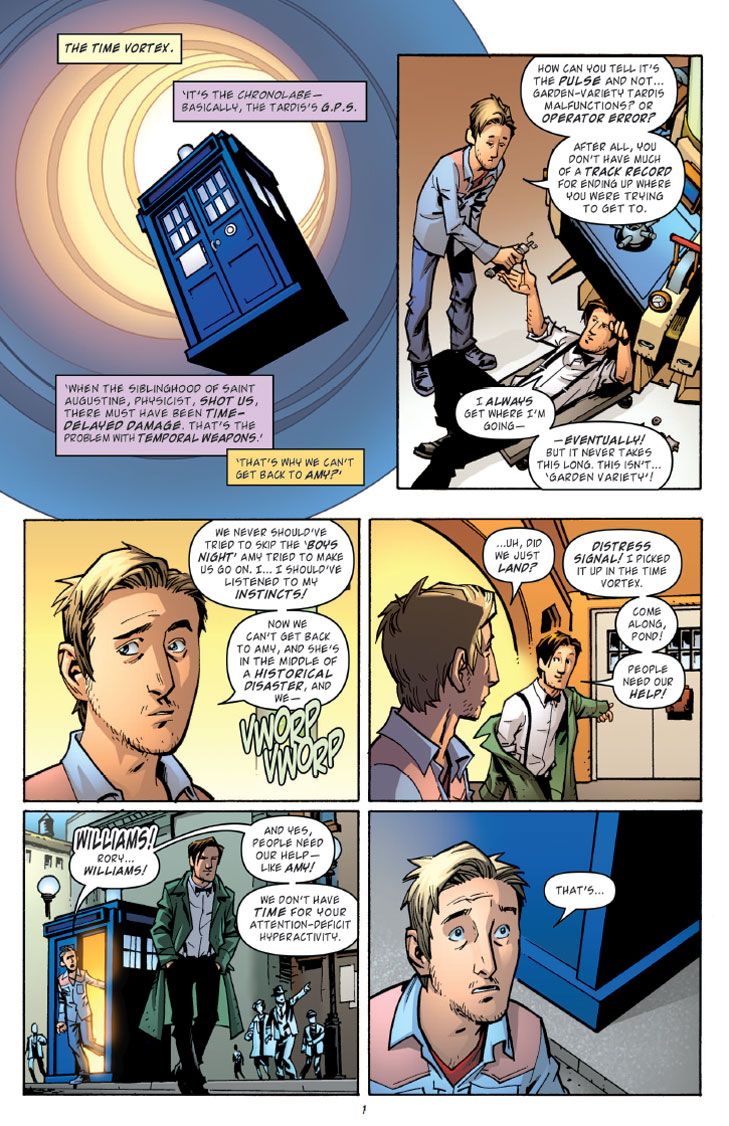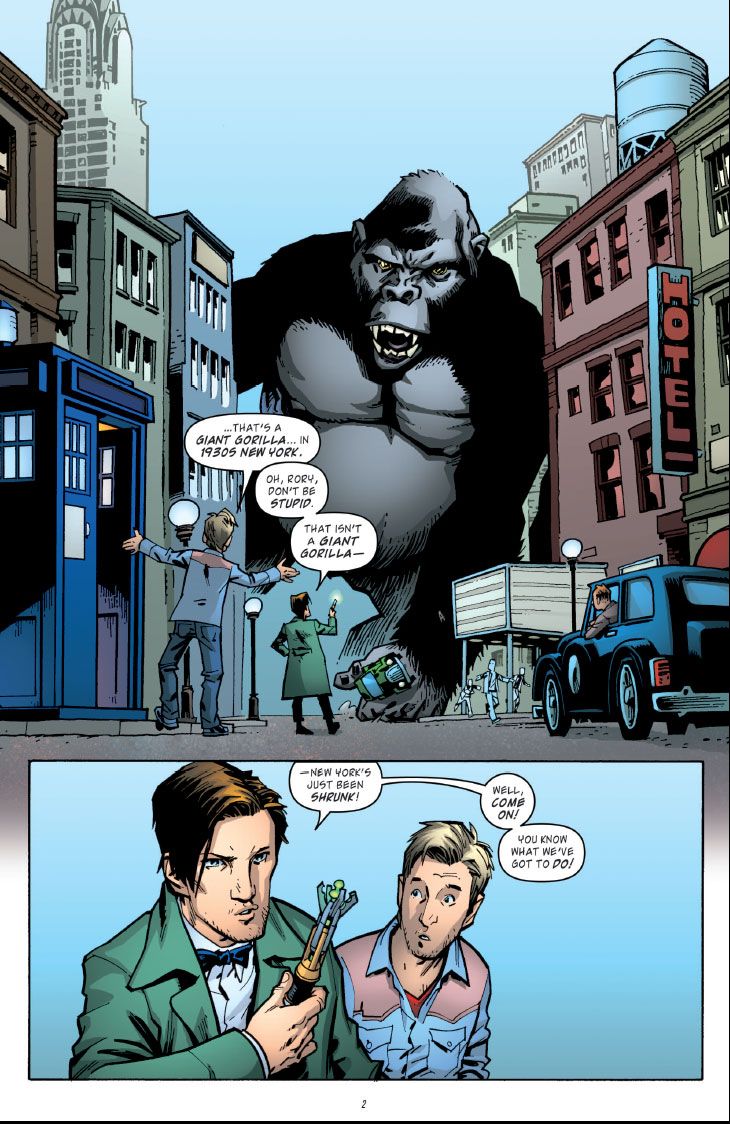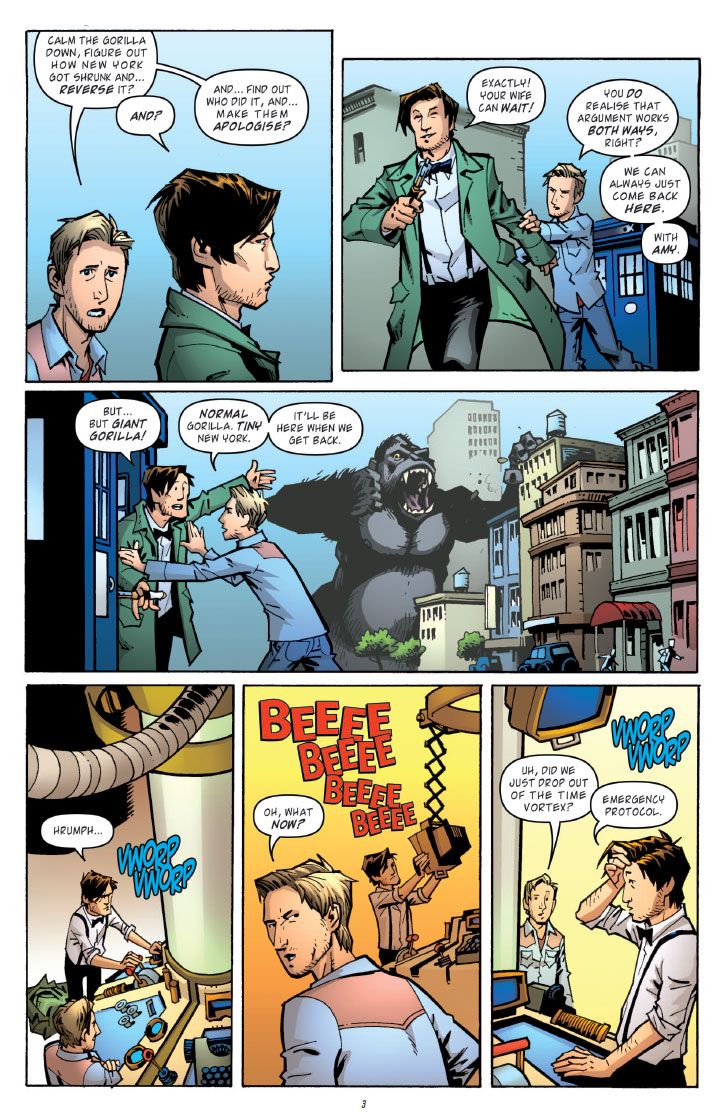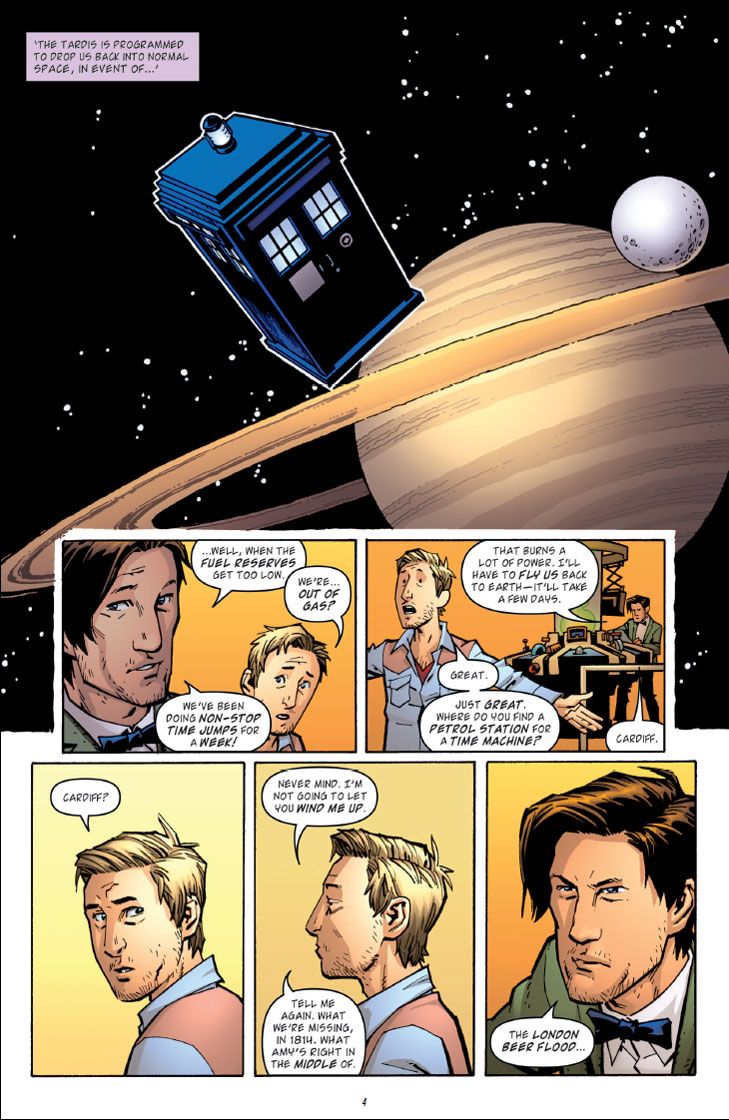BBC's revival of Doctor Who in 2005 met with immediate success, but with the arrival of Matt Smith as the Eleventh Doctor and Steven Moffat as executive producer, its popularity seemed to rise to a new level. IDW Publishing has been releasing Doctor Who comics since 2007, and this year launched a new series with writer Andy Diggle as "showrunner." With December's Issue 3, up-and-coming writer Brandon Seifert and artist Philip Bond stepped in for a two-part story in which Amy sends the Doctor and Rory on a boys' night out to help build their strained relationship.
Seifert has established himself in a relatively short time with his medical-horror series Witch Doctor, with co-creator/artist Lukas Ketner, which earned the attention of Robert Kirkman and a spot as the launch title for his Skybound Entertainment imprint. Seifert also was among the initial wave of creators invited to produce digital-first material at MonkeyBrain Comics. And most recently he was selected to write under Clive Barker for the Hellraiser series at BOOM! Studios.
Brandon and I got a chance to chat about his Doctor Who two-parter, how he handles horror in comics, and our shared history with fan fiction. IDW was kind enough to provide us with a preview of Doctor Who #4, which goes on sale Wednesday.
Robot 6: This week we get to buy Doctor Who #4 written by you. It's part 2 of your two-part story. Where did you leave us at the end of last issue? And what can we look forward to with this issue?
Brandon Seifert: My Doctor Who issues are a "time travel road trip buddy comedy" between the Doctor and Rory Williams, one of his two most recent companions. Basically, Rory's wife Amy tried to get the Doctor and Rory to do some "male bonding"... and rather than have to face a night together, they tried to "skip ahead" using the TARDIS. Which, of course, didn't work. Meanwhile, they left Amy in 1814... a couple hours before a weird historical disaster called the London Beer Flood!
I don't want to give away much about the conclusion, but I promise it's got more hijinks and misadventures for the Doctor and Rory — while Amy is off having to live through a big disaster, and has to figure out what to do about it.
I had a huge amount of fun writing this two-parter — and I threw all kinds of crazy stuff at it. We're already seen the Blitz, saber-tooth tigers and Rory and the Doctor on the moon. There's a lot more stuff like that in No. 4!
Sounds like a blast! I know that Witch Doctor has some sarcastic notes to it but am I right that this is your first time doing comedy?
I dunno, I definitely consider Witch Doctor a comedy. But that's just one of the elements in Witch Doctor, and some of the other stuff in there is pretty antithetical to comedy — like the horror. This Doctor Who story is definitely zanier than anything I've done before!
How has it been working with artist Philip Bond? That's some solid talent right there.
Right? It's really weird to be working with Philip! I love his art a lot, and I think he's a terrific fit for Doctor Who. We ended up a bit pressed for time on this story — to the point that IDW brought in Ilias Kyriazis to help with part of No. 4. But Philip's art has been great. And Ilias complements him really well!
I understand Andy Diggle is the series' main writer but IDW is rotating in writers for guest spots. That's quite an honor to be the first to step in. How did that come about?
Yeah, I'm really glad they picked me for it! Doctor Who is pretty much my favorite thing going on in pop culture right now, so pretty soon after the first Witch Doctor series came out, I emailed Doctor Who editor Denton Tipton and sent him some of my work. Denton and I talked for a bit, but nothing came of it until a few months later, when I contacted Chris Ryall, IDW's editor in chief, about a different project I wanted to pitch. Chris had liked Witch Doctor, and mentioned he thought I'd be a good fit for Doctor Who. So I started talking to Denton again, and he offered me a chance to pitch some story ideas. I was really glad the pitch they chose was my favorite of the ones I came up with!
Confession time: I know almost nothing about Doctor Who except as a kid I remember my father watching episodes starring a white guy with an afro. But since the TARDIS didn't transform into a giant robot, I wandered off. Hey, I was just a kid! Can you explain the appeal? What draws you to the character and his world? How did you become a Whovian (if you feel that accurately describes you)?
I think the thing for me is that there really isn't anything else like Doctor Who. Like, anywhere. It's an incredibly weird show. A thousand year old alien who travels around in a time machine ... that's shaped like a police phone booth? It's a very strange concept. But what's brilliant about it is that he can go anywhere in all of time and space, and he lives in a universe where magic and the supernatural is just highly advanced science... so you can basically tell any story in any genre with it. You can do historical stories, or SF stories, or fantasy or horror or whatever you want. It's one of the most versatile storytelling engines I've ever seen! But I totally understand when people don't "get" it. Like I said, it really is a strange concept. And the show itself varies wildly in quality. A few of the new series episodes have ended up being some of the best science fiction I've ever seen on television. But then other episodes are totally abysmal.
What did you think of Doctor Who: The Snowmen?
I was honestly pretty disappointed. It's setting up the first big shift in the show's status quo since Matt Smith took over as the Doctor and Steven Moffat came on as showrunner in 2009. But I really didn't feel like it sold the change every well. And the story itself wasn't all that great.
Any chance we'll get to see any of those other pitches for Doctor Who?
I'd love to do more for the Doctor Who comic. There's nothing set up at the moment, but IDW doesn't seem adverse to me returning to the TARDIS later. And while I don't know if those first batch of pitches would cut it — like I said, as of "The Snowmen" there's been some substantial changes to the series — coming up with new story ideas is never hard for me!
Meanwhile, the Witch Doctor: Mal Practice miniseries is just getting started and you've also got another miniseries under way, Hellraiser: The Road Below. Suddenly everything's coming up Brandon Seifert! Does 2012 feel like the year you arrived?
Pretty much! I mean, 2011 was when I got my career started. But the only book that came out that year was the first Witch Doctor miniseries and one-shot. So 2012 really felt like the watershed year for me! I'm hoping 2013 goes even better. I've got a bunch of projects, including some that haven't been announced yet. High hopes!
It seems like you're just getting started. Witch Doctor is one of those fantastic concepts where probably half the industry immediately asked themselves, "Why didn't I think of that?" I think I heard you've got about 50-some odd story ideas. Do you consider Witch Doctor to be your Walking Dead or Savage Dragon, in that you see yourself doing it for as long as possible?
That's definitely the hope, yeah! Witch Doctor turned out to be a really great sandbox to play in for me. I'd like to keep writing Witch Doctor stories forever. But, we'll see if that happens. Getting in this industry, I really quickly started learning that just because I want something doesn't mean it'll happen. There's a lot more involved in a comic than just the writer. And even if I don't get to just keep telling Witch Doctor stories ... I've got plenty of other series ideas that are just as versatile, and that I'm just as excited about!
What's the angle for this miniseries? It looks like the doctor becomes the patient?
Yep! The idea behind Witch Doctor is that we've got this brilliant jerk doctor who investigates supernatural diseases like vampirism, demonic possession, faerie infestations, etc. So one night after work he goes to a bar, meets a girl ... and wakes up the next day with no memory of what happened after that. Really quickly he realizes that the girl wasn't what she seemed, and that there's a larger plot involved. So basically it's the doctor infected with a supernatural STD, trying to cure himself and get to the bottom of why he was infected in the first place!
Witch Doctor probably wouldn't exist if you hadn't posted that original one-shot online. Do you have any other plans for Witch Doctor or any other stories as webcomics or through digital like comiXology?
Yeah, digital self-publishing really did the trick for us! There hasn't been any discussion of doing Witch Doctor digital comics, but I've got other digital stuff I'm working on. In November the digital comic Spirit of the Law that I did with Michael Montenat came out through MonkeyBrain Comics and comiXology. Michael and I are planning to do more work together, and I have other comics I want to do through MonkeyBrain. I like digital comics a lot, and there's lots of stuff I can do in that space that I either couldn't do easily in print comics, or couldn't do at all!
It must be pretty surreal working on Hellraiser. Are you just swapping scripts with Clive Barker all day long? Or is he more in the background approving things?
It's extremely surreal working on Hellraiser. I mean, this is a franchise that I was writing fanfic about back in high school! Clive is definitely the "man behind the curtain" on the project. He's the one directing the comics as a whole, and he reads all the scripts and sends notes on them. But I get those notes through my editor or through his film company. So far I haven't had any direct contact with him! Which just makes it more surreal.
You and I actually did some fanfic writing together back in the day, lo those years ago. Even then I thought you were creating from a different perspective, in many ways more ambitious and imaginative than the rest of us. Do you think writing fanfic helped you develop as a writer?
Ha! Thanks, dude. I wondered if that would come up in this interview.
I resisted as long as I could!
Yeah, that definitely helped. I honestly didn't do a lot of actual fanfic writing — maybe 50 pages, tops. But I did a lot of fanfic planning. I'd basically been planning stories in what's now labelled fanfic since I was a kid. Any time I was interested in some movie or TV show or comic or whatever, I'm come up with my own stories for it, and my own characters and stuff.
In high school I turned that into writing fan supplements for role-playing games, and in college I dabbled a little in writing actual fan fiction. That was honestly my last fiction writing before I started Witch Doctor!
I know you do extensive research for a lot of your writing. I've spent hours roaming around Wikipedia and following links to cited sources. When do you feel you have enough information? And do you ever feel confined by all of that information? How do you turn the facts you've got into fiction?
It's different for each project, and each script. For me, the more information the better, the more nuanced — but researching stuff and then synthesizing it into world-building is a great distraction from actual writing. For me, I usually hit a point where the stuff I've researched has generated enough ideas and detail that I get excited enough that I just start writing. For instance, this week I did a bunch of research about the Knights Templar for an unannounced project. And when I hit the point where I knew enough about them to see how they fit with what else I was doing and what twist I was going to put on them, I got really excited and wanted to start writing a story with them. In this case I unfortunately have way too much to do on my other projects to be able to just start writing Knights Templar stories — but the principle's the same!
And no, I never feel confined by information. It's all just story raw material. It makes the stuff I write more interesting and detailed — which makes me look like a better writer than I actually am!
That's totally the secret with Witch Doctor.
I remember a number of years ago seeing this debate among some comic professionals that you couldn't properly do horror in comics because you can't control the pacing of the story as much as you can with a movie or TV. That's obviously kind of a ridiculous limitation to put on comics, but as a comics writer, what is your approach to horror? How do you do it effectively in comics?
Yeah, that complaint's just as true with horror in prose books — and you don't see anyone claiming that Stephen King stories "aren't proper horror stories!" There are definitely storytelling devices in TV and film that are good for horror that you can't do on a printed page — but there's other stuff you can do in print more effectively than on the screen.
In Witch Doctor, we do a lot of creepy visuals — but not in the usual way horror does it. Some people call the book "gory," which just leaves me shaking my head. We have basically no blood or innards or whatever. But yeah, we have women whose tongues have been replaced by horrible centipede parasites, and demon larvae oozing out of cysts in kids' bodies. Which is pretty gross. And what's great about doing this in comics is that we aren't constrained by budget — and we don't have the problem of people looking at it and saying "that effect doesn't look real."
Or like in Spirit of the Law, there's a lot of stuff we did with tone in there just through the way Michael drew it and the way Ron Riley colored it. It's a really dark, moody book just for that. You couldn't put the kind of color palette Ron was using in a film — it would look weird, it wouldn't have the same effect. So, I think there's lots of stuff comics can do with horror that other media don't do.


